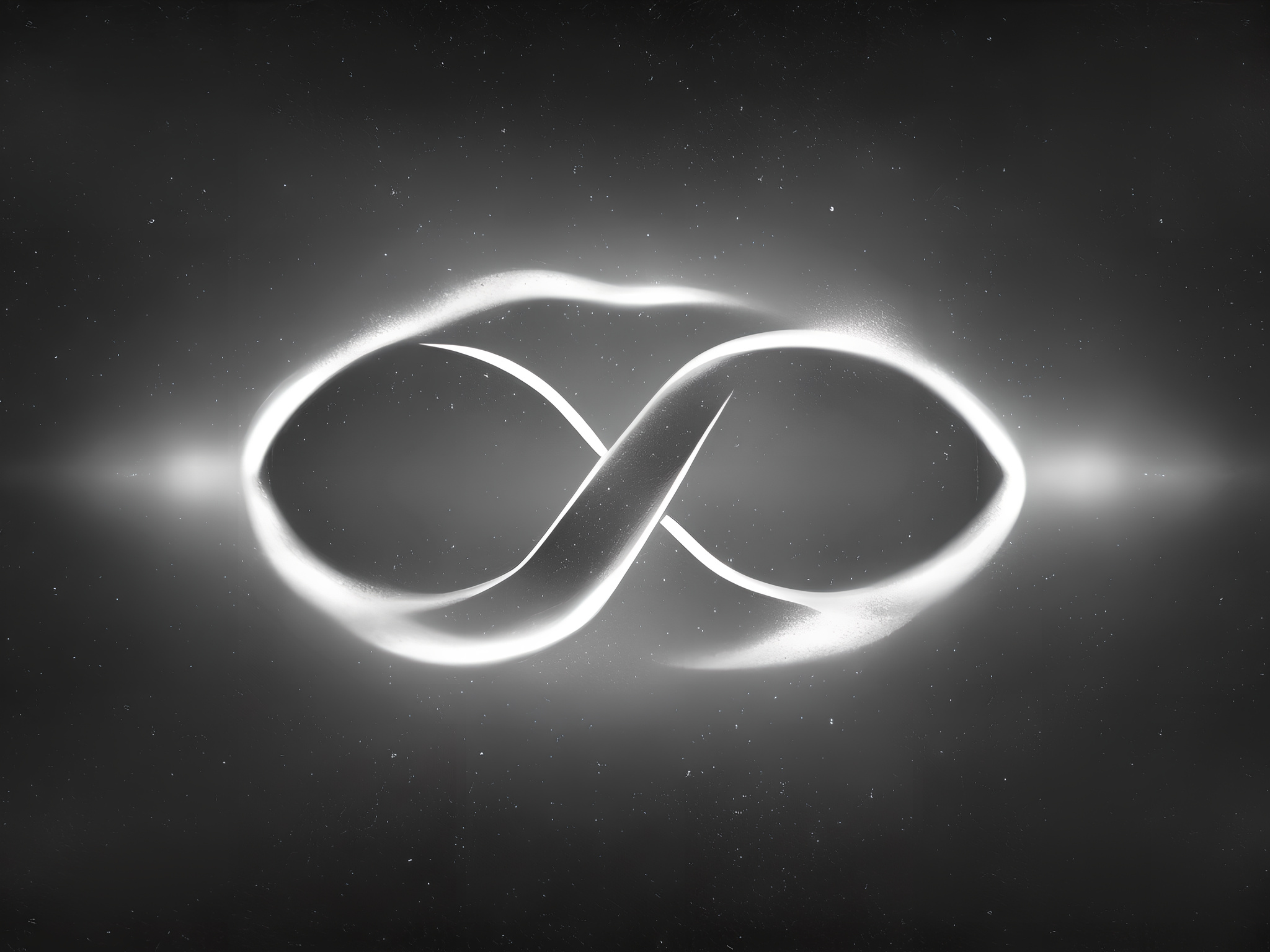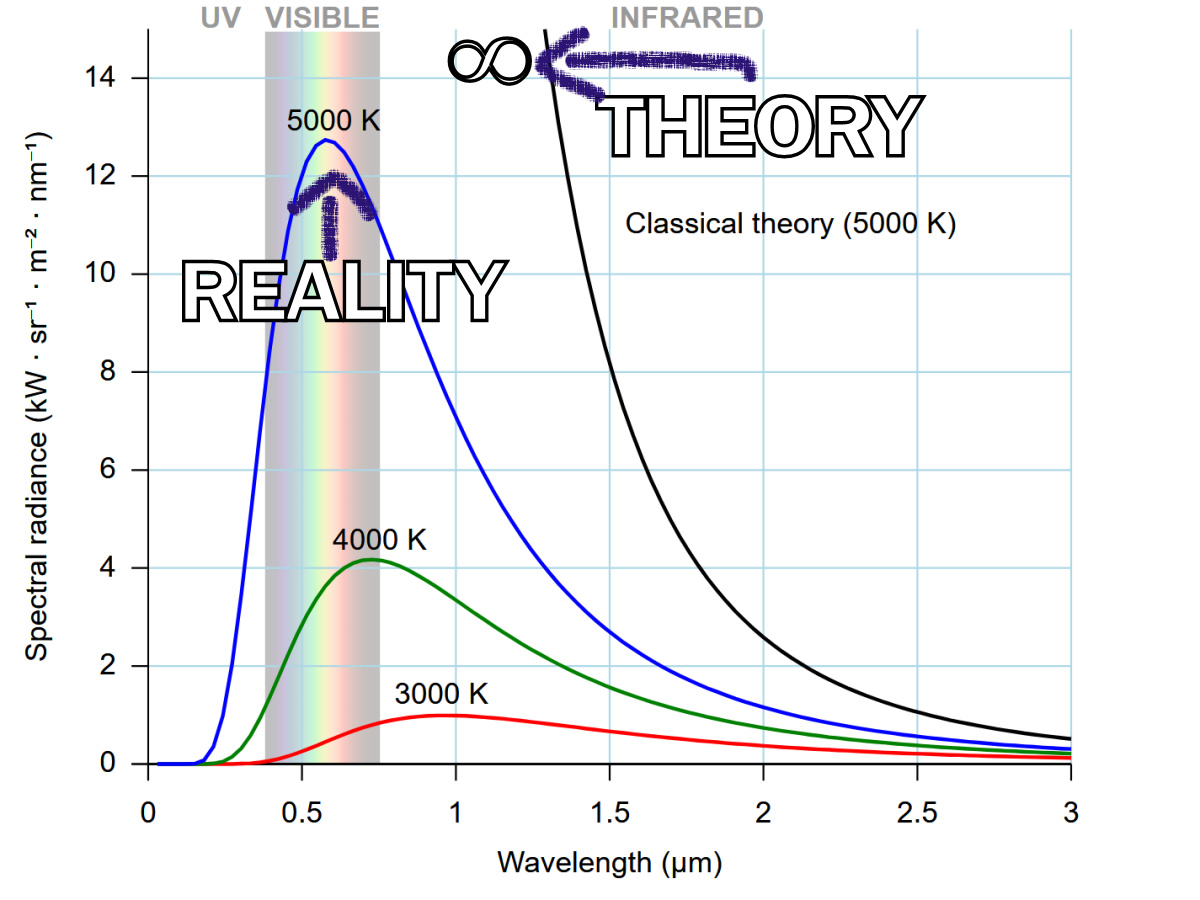Wie die Annahme unendlicher Auflösung zur absolut schlechtesten Vorhersage in der Physik geführt hat: Die Ultraviolett-Katastrophe. Ist das Universum von Natur aus "digital"?
In der Wissenschaftsgeschichte kommt es immer wieder einmal vor, dass eine Vorhersage eines mathematischen Modells zu einer katastrophal falschen Vorhersage führt.
Das heißt, eine Theorie, ein mathematisches Modell sagt etwas voraus, was aber völlig konträr zu den tatsächlichen, experimentellen Messergebnissen ist.
In diesem Fall stimmt entweder etwas mit der Theorie nicht oder das Experiment ist fehlerhaft.
Bei der Ultraviolett-Katastophe des 19. Jahrhunderts ist die Sachlage aber ziemlich eindeutig.
Die Ultraviolett-Katastrophe
Die klassische Physik (das Rayleigh-Jeans-Gesetz) hat nämlich vorausgesagt, dass die Strahlungs-Energie eines idealen Schwarzen Körpers mit steigender Temperatur im ultravioletten Bereich ins Unendliche ansteigen sollte. Black Body Problem.
Das war aber nicht der Fall. Im Gegenteil, die Strahlung im ultravioletten Bereich ging experimentell nämlich nicht ins Unendliche, sondern gegen 0. Eine Katastrophe für die theoretische Physik. Daher wird diese falsche Vorhersage auch die Ultraviolett-Katastrophe genannt.
Ein annähernd "Schwarzer Körper" (Black Body) mit einer hohen Temperatur ist zum Beispiel die Sonne.
Man weiß, dass Objekte mit steigender Temperatur Wärme in Form von elektro-magnetischer Strahlung abgeben. So wie die Sonne zum Beispiel.
Die Temperatur bestimmt das Spektrum der Strahlung und die Intensität. Je höher die Temperatur, desto geringer die Wellenlänge des Strahlungs-Maximum. Die Strahlung verlagert sich mit steigender Temperatur vom Infrarot in den ultravioletten Bereich, allerdings geht die Strahlungskurve Richtung kleinerer UV Wellenlängen gegen 0, während das Modell unendlich vorausgesagt hat.
Die Sonne strahlt nämlich im ultravioletten Bereich nicht unendlich stark, was man bereits im 19. Jahrhundert leicht experimentell nachweisen (sehen) konnte.
Irgendetwas stimmte also mit dem Modell nicht.
Digitales Universum?
Diese Diskrepanz konnte erst Max Planck um 1900 auflösen. Nicht das Modell war grundsätzlich falsch, sondern eine bestimmte Annahme. Die unendliche Auflösung der elektromagnetischen Strahlungsenergie.
Max Planck fand zufällig heraus, dass wenn man die Strahlungs-Energie "quantisierte", das heißt wenn die Energie nur diskrete Werte (ein Vielfaches der Planck-Konstante ~ 10^-34 Joule-Sekunden * Frequenz) annehmen konnte, aber keine Werte dazwischen, dass dann die Unendlichkeit auch im Endergebnis verschwand und sich die Vorhersage plötzlich mit den Messergebnissen deckte.
Planck hatte damit ohne es zu wissen, die Energie von Photonen herausgefunden und den Grundstein zur Quanten-Theorie gelegt. Die Tragweite seiner Entdeckung war ihm wahrscheinlich zu diesem Zeitpunkt noch gar nicht bewusst.
Bis ins Anfang des 20. Jahrhunderts ging die klassische Physik eher davon aus, dass das Universum eine unendliche Auflösung hätte, das heißt, alle physikalischen Größen stetig, kontinuierlich bzw. "smooth" sind. Heute würde man sagen, das Universum sei "analog".
In der Quanten-Theorie geht man hingegen eher davon aus, dass die physikalischen Größen quantisiert, diskret, nicht mehr kontinuierlich sind. Mit der Brille des Computerzeitalters würde man vielleicht sagen "digitalisiert".
Auch Zeit und Raum haben eine maximale Auflösung, Planck-Länge (10^-35 Meter) und Planck-Zeit (10^-44 s), darunter würde man Probleme mit den Naturgesetzen bekommen.
Das ist noch kein Beweis, dass das Universum keine unendliche oder kleinere Auflösung hat, aber genausogut könnte die tatsächliche Auflösung sogar über den Planck-Konstanten liegen.
Jedenfalls denke ich, dass diese nicht unendlich ist. Die Ultraviolett-Katastrophe hat gezeigt, dass eine falsche Annahme zur Unendlichkeit (unendliche Auflösung) zu einer katastrophalen Vorhersage führte.
Was sagt ihr dazu? Denkt ihr, dass das Unviersum eine unendliche Auflösung hat oder das Universum in Wirklichkeit von Natur aus "digital" ist?
ps. ein ähnliches Schicksal wie der Ultraviolett-Katastrophe könnte auch der Singulariäts-Behauptung von Schwarzen Löchern und der Unendlichkeit des Big Bang widerfahren.

Is the universe infinite or rather finite? AI-generated illustration (Stable Diffusion)
The Ultraviolet catastrophe

Source: https://en.wikipedia.org/wiki/Ultraviolet_catastrophe
English
Is the universe inherently "digital"?
In the history of science, it happens again and again that a prediction of a mathematical model leads to a catastrophically wrong prediction.
This means that a theory, a mathematical model, predicts something that is completely contrary to the actual, experimental measurement results.
In this case, either something is wrong with the theory or the experiment is flawed.
Ultraviolet catastrophe
In the case of the ultraviolet catastrophe of the 19th century, however, the situation was quite clear.
Classical physics (the Rayleigh-Jeans law) predicted that the radiant energy of an ideal black body should increase to infinity with increasing temperature in the ultraviolet range. Black body problem.
But this was not the case. On the contrary, the radiation in the ultraviolet range did not experimentally go to infinity, but towards 0. A catastrophe for theoretical physicists. This is why this false prediction is called the ultraviolet catastrophe.
A nearly "black body" with a high temperature is, for example, the sun.
It is known that objects emit heat in the form of electromagnetic radiation as their temperature rises. Like the sun, for example.
The temperature determines the spectrum of the radiation and the intensity. The higher the temperature, the shorter the wavelength of the radiation maximum. The radiation shifts from the infrared to the ultraviolet range as the temperature rises, but the radiation curve tends towards 0 in the direction of shorter UV wavelengths, whereas the model predicted infinity.
The sun does not radiate infinitely strongly in the ultraviolet range, which could be easily demonstrated (seen) experimentally as early as the 19th century.
So something was wrong with the model.
Digital universe?
Max Planck was first able to resolve this discrepancy around 1900. It was not the model that was fundamentally wrong, but a certain assumption. The infinite resolution of electromagnetic radiation energy.
Max Planck discovered by chance that if the radiation energy was "quantized", i.e. if the energy could only assume discrete values (a multiple of Planck's constant ~ 10^-34 joule-seconds * frequency), but no values in between, then infinity also disappeared in the final result and the prediction suddenly coincided with the measurement results.
Planck had thus discovered the energy of photons without knowing it and laid the foundation for quantum theory. He was probably not even aware of the significance of his discovery at the time.
Until the beginning of the 20th century, classical physics tended to assume that the universe had an infinite resolution, i.e. that all physical quantities were continuous or "smooth". Today, we would say that the universe is "analog".
In quantum theory, on the other hand, it is assumed that the physical quantities are quantized, discrete and no longer continuous. With the glasses of today's computer age, we would perhaps say "digitalized".
Time and space also have a maximum resolution, Planck length (10^-35 meter) and Planck time (10^-44 s), below which there would be problems with the laws of nature.
This is not yet proof that the universe does not have an infinite or smaller resolution, but the actual resolution could just as well be higher than the Planck constants.
In any case, I don't think it is infinite. The ultraviolet catastrophe has shown that a wrong assumption about infinity (infinite resolution) led to a catastrophic prediction.
What do you think? Do you think that the universe has an infinite resolution or that the universe is in fact "digital" by nature?
ps. a similar fate to the ultraviolet catastrophe could also befall the singularity claim of black holes and the infinity of the Big Bang.
Finite or infinite universe
Part 1: Definitions
https://stemgeeks.net/hive-163521/@vikisecrets/why-the-universe-is-most-likely-not-infinite-part-1-definitions-reply-with-infinite-or-finite
Part 2: Scientific question or not?
https://stemgeeks.net/hive-163521/@vikisecrets/why-the-universe-is-most-likely-not-infinite-part-2-scientific-question-or-not
Part 3: Infinity as a placeholder for ignorance
https://stemgeeks.net/hive-163521/@vikisecrets/why-the-universe-is-most-likely-not-infinite-part-3-infinity-as-a-placeholder-for-ignorance
Part 4: Everything we measure is finite
https://stemgeeks.net/@vikisecrets/why-the-universe-is-most-likely-not-infinite-part-4-everything-we-measure-is-finite
Part 5: Popular argument against infinity
https://stemgeeks.net/@vikisecrets/why-the-universe-is-most-likely-not-infinite-part-5-popular-argument-against-infinity
Live your Secrets and Hive Prosper 🍯
xx Viki @vikisecrets
Posted using STEMGeeks
!BBH
Your Content Is Awesome so I just sent 1 $BBH(1/5)@vikisecrets! (Bitcoin Backed Hive) to your account on behalf of @bitandi.
It is finite, but so big which can be considered almost infinite
I wonder what the universe expands about.
you explore in this article how assuming infinite resolution in physics led to Ultraviolet Catastrophe. this was a major incorrect prediction in the last 19th century.
Ich glaube, diese falsche Annahme unendlich vieler Schwingungszustände ist noch kein Beweis für ein "digitales" Universum. Das Universum besteht aus konkreten Teilchen, die naturgemäß eine bestimmte Größe haben, also nicht unendlich klein sein können (auch wenn sie aus noch viel kleineren Quarks bestehen). Daher ist auch in der Quantentheorie eines analogen Universums kein Platz für unendlich "smoothe" Abläufe.
Man kann auch ein analoges Universum mit unendlicher Auflösung nicht beweisen, denke eine begrenzte, sehr kleine Auflösung, die für uns Menschen smooth wirkt, da wir die Auflösung nicht wahrnehmen können, ist plausibler. Das Universum könnte auch von Natur aus digital sein, ohne notwendigerweise eine Computersimulation zu sein.
In my opinion, any material object is finite. At the beginning of the Universe, there was a limited number of elementary particles. The number of these particles today is also limited.
I don't think infinite exists, but we as people perceive things as infinite that we cannot unravel in our lifetimes.
Zwei Dinge sind unendlich, das Universum und die menschliche Dummheit.
Aber beim Universum bin ich mir noch nicht ganz sicher.
Albert Einstein.
Hmm
I don’t think the universe has an infinite resolution though…
Damn, my head hurts now. 😂😂😂
It's just that the predictions of such things often turn out to be wrong.
if its infinite.
Where do the resources formed come from?
I don't think it's infinite but it could way too large for us to figure out normally. We don't know enough about space yet.
Scientists say something today and the later discoveries prove them incorrect.
I don't think the universe is infinite. That's another thing if we are able to figure out its size.
Hab gerade dieses Video entdeckt. Da geht es auch um Grenzen des Verstehens.
Ein schlafendes Schwarzes Loch.
I find all things about space and the universe very interesting, although some are not so easy to understand, if you're not studying in that field.
!WITZ
lolztoken.com
Sie fliegt zum Wolkenkratzer.
Credit: mugglow
$LOLZ Token gesendet
Verwende den Befehl !WITZ oder !LOOL, um einen Witz und ein $LOLZ zu teilen.
Farm LOLZ tokens when you Delegate Hive or Hive Tokens.
Click to delegate: 10 - 20 - 50 - 100 HP
.(10/10)@vikisecrets, ich habe dir im Namen von @thehockeyfan-at einen
hmmmm, the DIGIverse? 🤔
Congratulations @vikisecrets! You have completed the following achievement on the Hive blockchain And have been rewarded with New badge(s)
You can view your badges on your board and compare yourself to others in the Ranking
If you no longer want to receive notifications, reply to this comment with the word
STOPCheck out our last posts: